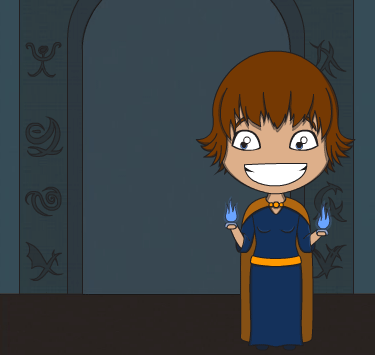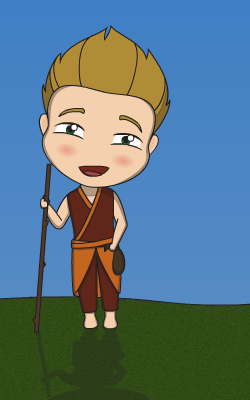Feel free to share
 Using this site means trees will be planted. ^.^
Using this site means trees will be planted. ^.^
(Find out more)
RPG Character ideas - Corruption
In many RPG games player characters often fall into similar tropes, which is often due to the game's mechanics. Some class and race combinations are simply the strongest, some stereotypes are just so strong people don't like to deviate from them, and sometimes the game mechanics, the class abilities, and other game elements just get in the way of being able to properly change up a character's make up a lot. Of course, many people, like me, believe story and fun come before rules, but I figured it'd be fun to share some character concepts nonetheless, in most cases without even having to change the rules.
So consider this part 1 of a series of character concepts, some aimed more at specific games than others, but each hopefully as much fun as the other. These concepts are aimed toward player characters, but could work just as well as non-player characters of course.
These characters are focused more on fun role play or embodying different ideas. They're by no means original, everything has been done after all, but there might be some you haven't encountered before, and hopefully you'll find at least some fun twists on ideas.
In this first part the main theme is corruption, but not necessarily in the more common, and sometimes more stereotypical ways. A corrupted paladin or clerk, for example, has been done a lot, but there are far more ways to introduce corruption, in one of its many forms, to a character. Hopefully my ideas below will give you some inspiration to help breath life into a new character.
Arcane addict

The first form of corruption on the list is addiction, in this case in the form of arcane powers. Wizards, sorcerers, it doesn't matter what magical user you are, to some the powers they wield can be an addiction. How far you wish to take this is, of course, entirely up to you. Perhaps your character needs to be around some form of magic at all times, perhaps a huge burst of magic needs to be discharged every so often, or perhaps magical items must be worn at all times.
Even each of these three examples could be taken from small to huge. Being around magic could be as simple as having to be around magical beings, or casting a simple spell that causes a ball of magical light to float around you, or it could be as large as having to cover your entire body in magic through a spell like 'mage armor', 'stoneskin', or any other spell like these.
Having to discharge magic at specific moments could be as simple as casting a small ball of energy, or more complex like having to spend ability points to cast a bigger spell, which could be a huge detriment at a later point when you need that spent ability point, or even immediately if this discharge gives away your location.
You can also put the focus on the spells you use. The bigger the better, and the more they affect you the better. Spells like the previously mentioned mage armor or stoneskin, or perhaps more projectile based spells, rather than detection, spells for example.
As far as changing rules go, you could implement a system that makes you roll a dice to see whether you're able to handle your addiction or whether you have to deal with it, perhaps once every day you have to make a roll, for example.
Alternatively, the longer you ignore your addiction, the bigger the negative 'bonus' on your rolls.
Animal binder
This one is aimed mostly at ranger types, and any other class that has animal companions. Animal bonds are often a great, beautiful thing, but some characters might see animals merely as tools at their disposal. Rather than bonding with an animal to earn its trust, this character would rather just bind them through any way they can. Mind control abilities, a show of dominance, pain and suffering. To this character, animals could even be used as bait, sacrificial lambs (ba-dum tsh), or even as food when they feel like it.
Obviously this type of character isn't for everybody. I'd certainly never play it, but there are plenty of people who do enjoy an evil campaign with less than savory characters. It can definitely create dramatic conflicts, and, if you're like me, could make for an easy-to-hate, villainous character.
Of course, most ranger classes in most game systems have spells and abilities themed around animal bonds, rather than binds. But with a little renaming here and there, some role play sprinkled on top, and perhaps some thematic changes, rules don't really have to be broken or changed.
Abilities like animal companionship could easily be renamed to animal dominance, and any kind of animal tracking abilities quickly become a far darker tool when the goal is dominance and intimidation.
Flame druid
The flame druid does not believe they are corrupted, and arguably aren't. Instead, they believe the world has been corrupted, and only fire can cleanse it, similar to how a forest fire destroys everything, but leaves enough for a forest to regrow anew in a soil fertilized because of the fire itself.
Flame druids don't necessarily have to be purely evil characters either, they might only seek out the destruction of those elements they deem corrupted. A forest may be perfectly fine, but a garden might face the fury of the flame druid, for example.
Depending on how far you wish to take it, a flame druid could fit into an ordinary group of adventurers with relative ease. Sure, there might be some conflicts once in a while, but what group doesn't have those?
Most game systems give druids plenty of fire spells as well, so as far as rule changes go, there really don't have to be any. Some thematic changes might be required depending on how far you wish to take it, but that's about it.
Pied piper
I'm sure many of you are familiar with the story of the pied piper of Hamelin, but for those of you who aren't, here's a short summary: A piper goes to a village infested with rats, and tells the villagers he can get rid of all the rats. They promise him to pay him handsomely. He uses his magic pipe to lure all the rats away, but he villagers refuse to pay. The rats are gone anyway, right? Well, the piper is furious, and uses his magic pipe to lure all the children away from the village as an act of vengeance.
Now, I'm not suggesting you play a character who lures away children, that's really creepy. But most bards are designed around the idea of magical instruments and music related abilities, which could be turned into incredibly creepy concepts as well.
Bards are often able to influence the minds of others through all sorts of abilities, which could be used for horrific psychological warfare, perfect for a main villain, for example.
To illustrate this with spells from D&D 5e, and in the form of horrendous actions: A pied piper might cast suggestion to tell somebody to go into an empty cave, and meditate. Nothing dangerous about that, so this doesn't break the rules of the spell. The bard can then cause a collapse of the entrance, effectively trapping that person in the cave, and potentially dooming them to death.
But an evil pied piper might take it a step further. Using disguise self they could turn into that person, then completely destroy their reputation or take all their possessions, or even mess with people looking for the trapped person.
A truly evil person could do far more, and cause far more emotional pain with spells like Tasha's Hideous Laughter, Dream, Mass Suggestion, Modify Memory, Mislead, and so on.
So, definitely a potentially truly dark character concept. I personally would never enjoy playing a character like this, but it'd definitely feel incredible to finally defeat a character like this if they were the main villain, for example.
For added villain difficulty, have a band of various musicians, rather than just one pied piper.
Drunken monk

A potentially more lighthearted concept is the drunken monk. It's a common one, of course, but it can be an interesting one to play with. This one can go two ways though. The first is a crippling alcoholism that will quickly turn very dark. Alcoholism is a form of corruption after all. The second is the more cartoony drunk, the type of fighter who can only fight when drunk, or is just in an eternal state of drunken bliss. Because everything so far has already been a bit of a downer, I'm going to focus on the cartoony drunk to add a little bit of lightheartedness.
A big chunk of the drunken monk character is done through role play, but you can turn abilities into thematic ones as well. Bonuses could increase or decrease depending on how drunk the monk is, weapon types could be changed accordingly, and, in the case of D&D 5e, you could even turn ki points into a system designed around drunkenness. Instead of restoring them with a simple rest, you have to consume alcohol. This adds a layer of difficulty of course, but it could make for a fun challenge.
Another advantage of the drunken monk is that there's plenty of inspiration to draw from. There's a few Jackie Chan movies, like The Forbidden Kingdom, there's (probably) countless anime characters, you could even count Jack Sparrow, sorry, Captain Jack Sparrow as an eternal drunk, but not as a monk of course. There's also Thoros, the drunken priest from A Song of Ice and Fire/Game of Thrones. Not a monk, but close enough. Besides, you could apply the adorable drunk type to all types of characters to be fair.
The undoer
Last but not least is the undoer, but not in the way you might expect. The undoer is meant to be a warlock or similar type who uses their powers to destroy all those like them, or all those evil forces bestowing powers upon people like them. The undoers try to undo the corruption caused by these evil forces, even if it costs them their own health, sanity, or other aspect of their being.
These characters can make for an interesting dynamic between how much you allow yourself to be corrupted in order to be able to undo the bigger corruption overall. Would you take being shunned by society in exchange for powers that allow you to dominate and thus get rid of demons? Would you sell your soul for powers that could save the world?
In many ways these types of characters could also lead to anti-heroes, which are often a popular choice in and of themselves.
You could change it up even more, perhaps you need to undo the corruption you've spread. Perhaps instead of destructive spells you pledge to only use empowering spells. This can be difficult or even impossible in some gaming systems, but many allow for at least some leeway.
Final note
A lot of the rule and thematic changing elements in some of the previous ideas could also be solved by multi-classing, assuming your game system allows this of course. I personally really enjoy bending and twisting things within a specific class, but a flame druid could have a few levels in sorcery or wizardry for more fire power, for example.
Breaking rules for the sake of narrative is always an option too, of course. Just make sure you don't break it in ways that make a character overpowered.